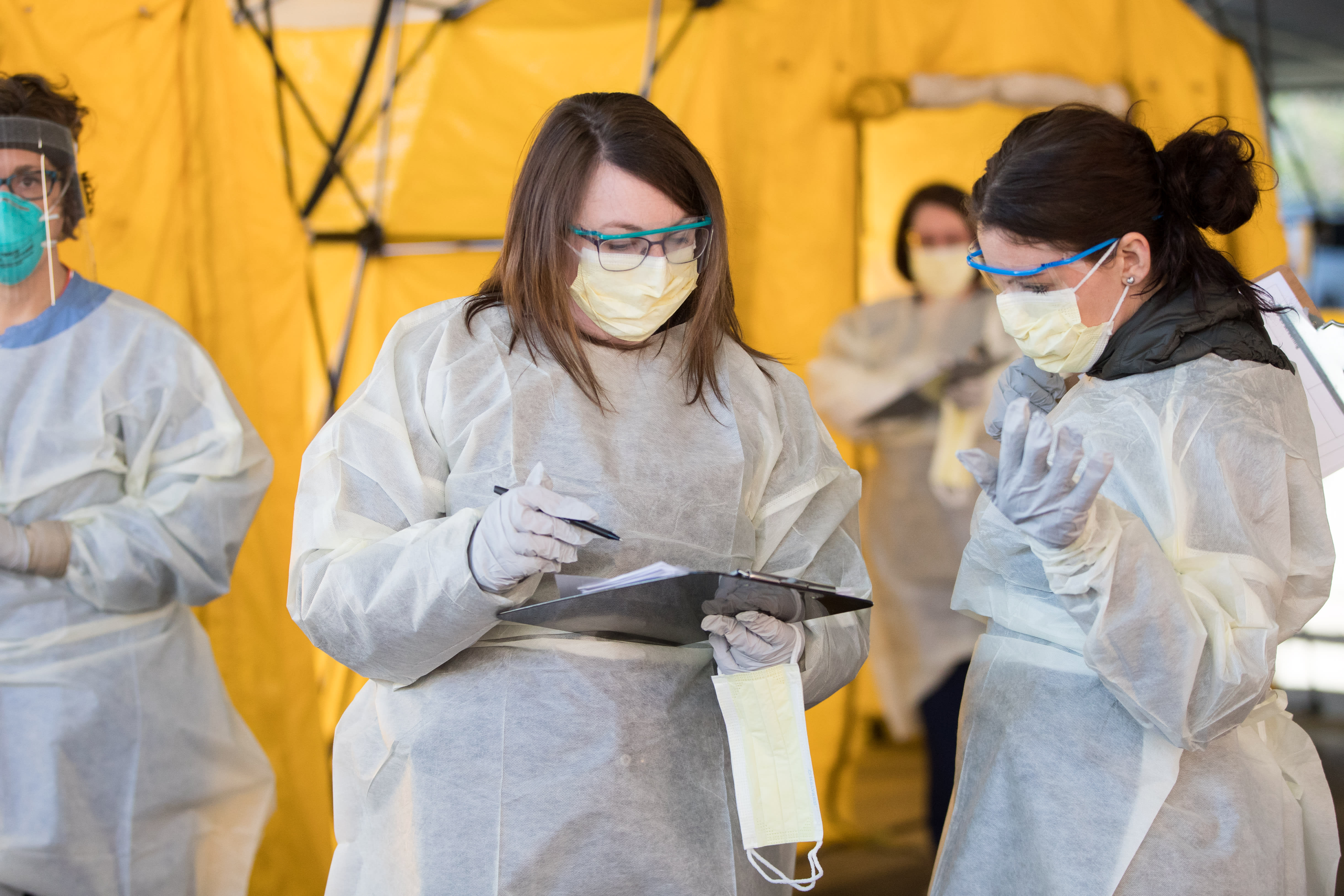
Healthcare workers look at paperwork outside of medical tents where Covid-19 tests are being conducted at Newton Wellesley Hospital in Newton, Massachusetts, U.S., on Wednesday, March 18, 2020.
Scott Eisen | Bloomberg | Getty Images
U.S. hospitals are setting up coronavirus wards and tents, seeking emergency credit lines and lobbying Washington for a $100 billion stabilization fund to help ramp up capacity and buy necessary supplies to meet an expected onslaught of patients as the COVID-19 pandemic sweeps across the nation.
“We believe hospitals and health systems should be top priority number one for the Congress, at this moment,” said Robyn Bash, vice president for government relations at the American Hospital Association.
The AHA estimates that some hospital systems are losing up to $1 million a day, and the costs are mounting. In many states hospitals have been forced to cancel all elective surgeries, along with non-emergency procedures which generate higher revenues for their facilities. At the same time, they are ramping up staffing to handle the expected influx of acute care patients and spending on as much acute care equipment as they can find.
‘Hot zones’
“We have several hot zones. More are coming. The difference between today and tomorrow is a marked difference — because there’ll be more patients tomorrow testing positive, there’ll be more patients needing critical access to care,” said Bash.
At Mount Sinai Health System’s Morningside hospital in New York City, the number of coronavirus patients at the 500-bed facility doubled over two days this week, to 20 patients needing hospitalization, another 18 who were being observed for potential infection and more than 50 being tested in the emergency room in one day.
“Today we are we are able to manage with both the staff that we have, and with the space that we have, but obviously if the demand keeps going up unrelentingly, we’re going to have to find alternatives,” said Morningside president Arthur Gianelli.
Coronavirus wards
Morningside typically runs at more than 80% occupancy, but is now repurposing beds normally used for elective surgery patients to create wards for treating coronavirus cases, setting up a tent outside its emergency room to expand capacity, and ramping up staffing by reassigning personnel and asking retired physicians to help pick up non-emergency care.
They are prepared to spend more on acquiring ventilators to help patients breathe, and protective equipment for their clinicians and patients, but they are struggling to find enough supply.
“We have enough right now, to be able to be taking care of our patients for the next couple of weeks,” said Gianelli.
It’s the same story at New York City’s largest health system, New York-Presbyterian Hospital, which warned its debt holders this week that the financial toll of its emergency response will be steep. The hospital had budgeted an operating income of $246 million this year, but now is forecasting operating losses of $100 million to $450 million dollars for 2020.
The health system said it was seeking to increase its current $350 million line of credit, according to a regulatory filing.
‘Unprecedented health crisis’
“The COVID-19 outbreak is an unprecedented health crisis that will require an extraordinary amount of resources for an indefinite period of time. We have been planning and preparing and part of that includes ensuring the hospital remains on strong financial footing,” a New York-Presbyterian spokesperson told CNBC in a statement, while adding that “the financial health of the hospital is stable and there will be no impact on our ability to meet our mission.”
Credit analysts at Moody’s Investors Service say large not-for-profit health systems should be able to weather the storm and continue to have access to credit right now, nonetheless the ratings company lowered its outlook on the group to negative from stable because of the ongoing uncertainty.
“The majority of our rated portfolio [hospitals] should be able to withstand a temporary disruption — though temporary is not a well-defined term right now,” said Lisa Goldstein, associate managing director at Moody’s, adding that many hospitals have been taking steps to draw down credit lines to make sure they can maintain liquidity.
Equity analysts at RBC Capital Markets estimate that for-profit publicly traded hospitals such as Universal Health Services, HCA and Tenet Healthcare could see as much as a 37.5% drop in annual cash flow due to the cancellation of higher margin elective surgery procedures and lower reimbursement rates for older coronavirus patients on Medicare, while at the same time facing higher costs for the emergency response. But the analysts say revenues should bounce back.
Long overhang
“While we acknowledge that labor issues could compound margin pressure in the near-term, we remind investors that higher-dollar elective cases historically return following period of disruption,” wrote RBC’s Frank Morgan in a note to clients.
But Moody’s analysts say the dramatic downshift in economic activity from the COVID-19 crisis is likely to pose a very long overhang for hospitals and the health-care industry.
“What we expect to see is a negative impact to the economy, even after the containment period — people spending less, putting off electives delaying health-care needs. So, it’s not just Covid, although that’s front and center,” said Goldstein.
For hospital leaders like Gianelli, in the heat of the crisis, those long-term concerns can wait. What he wants now is funding and help from government officials to make sure his clinicians have the protective equipment they need, and the hospital can acquire more ventilators to help treat their acute coronavirus patients.
“It is essential that the federal government, after they’ve taken care of folks who are unemployed, and after they’ve taken care of some of these industries that are teetering on the brink of collapse that the federal government look to stabilize the hospitals that are in the midst of this pandemic,” Gianelli said.

